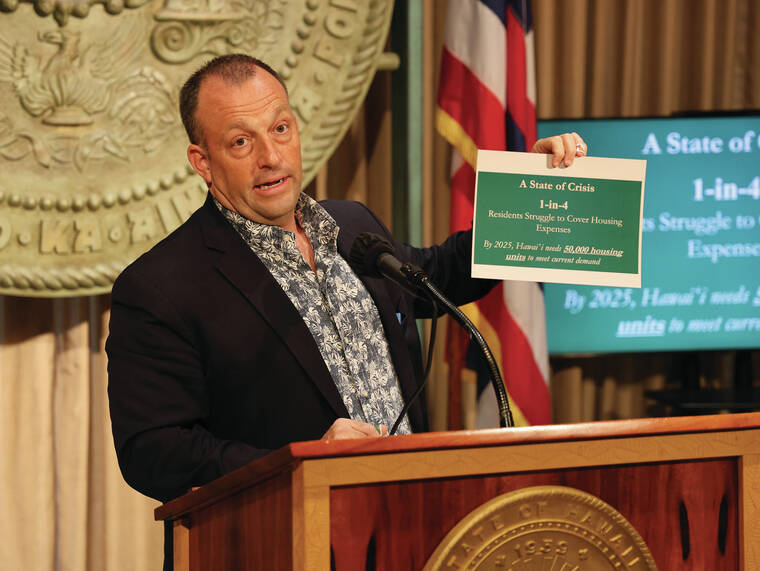Gov. Josh Green signed an emergency proclamation Monday to streamline state and county housing projects to help alleviate Hawaii’s longstanding housing shortage.
“The median cost of a house on Oahu is $1.1 million, statewide it’s $850,000, and for condos, it’s around $600,000,” Green said Monday during a livestream with the Honolulu Star Advertiser. “You have to, right now, earn $253,000 as a family to comfortably afford a house, especially with interest rates the way they are.”
The proclamation will last for one year and will establish a committee called Build Beyond Barriers within the governor’s office.
The committee will have the ability to approve housing projects and expedite development by removing impact fees and the general excise tax, alleviating environmental impact statement requirements, allowing third parties to speed up the permitting process, and other changes.
Approval will be based on 12 specific criteria, and members of the group will include representatives from both state and nonstate agencies including the Hawaii Housing Finance Development Corporation, Hawaii Public Housing Authority, Sierra Club of Hawaii, and others.
Public input will still be required, and the first meeting of the committee will take place in August.
Approved projects will have three years to start development to ensure they are completed in a timely manner.
“Right now, there’s already 50,000 (housing) units in the pipeline, but they’ve gotten stuck somehow, because there’s too many fees, or they can’t get permits, or because their financing gets hung up due to the many, many rules that are redundant at the state and county levels,” Green said.
“We’re not going to be doing any building on conservation land,” he added. “We’re not going to be doing any building on important ag land. We’re just going to streamline this process, because right now, it takes like nine months to get a building permit. It’s really nuts.”
Green added fewer than one-in-three households can afford a single-family home in Hawaii, and the state has the highest median home price, the highest cost of living, and the largest amount of housing development regulations in the U.S.
“Some of these things are just too difficult to pass legislatively, but doing them in an emergency rule setting for a year is quite efficient,” Green said, adding he will try to turn the proclamation into legislation he will introduce next session. “I will also give (the Legislature) a bill with all of these provisions with a three-year sunset on it, meaning it would expire after three years (if approved).”
Green’s proclamation also will ease some land use restrictions for potential large-scale housing development projects, which would still require approval by county councils.
“We’re going to adjust the land use rules to go from a cap of 15 acres where you can build a development in a streamlined way, to 100 acres,” Green said.
He added that over 200 groups and individuals were contacted to consult him about the proclamation, and he estimates it will cut down the time between a project’s application and completion date by roughly 90%.
Green said one of his reasons for the emergency proclamation was that for the first time in history, more Native Hawaiians are living on the mainland than in the state.
Part of the reasoning includes an average of 23 years spent on the waitlist for state Department of Hawaiian Home Lands residential plots, as well as Native Hawaiians reporting the lowest median household income of all major ethnic groups in Hawaii and the highest rate of poverty, making the group twice as likely to become homeless, according to the proclamation.
“If anyone says this isn’t an emergency or crisis, they are not aware of what is going on in Hawaii,” Green said, adding that 1 in 4 state residents can no longer cover housing expenses because housing costs rose by 1200% over the last 20 years, while salaries went up by only half that.
State Senate Housing Committee Chair Stanley Chang supported the emergency proclamation by comparing his current situation to that of his father.
“(My father) was a UH professor, a state employee with one salary, and he was able to buy a house and put my brother and me through school,” Chang said during the signing ceremony. “Today, for me as a state employee to buy that same house, it would cost me over 40 years of my entire salary.”
Chang noted there are 13,000 high school seniors graduating each year, but only 2,000 housing units are built annually.
“We have 14,500 people leaving Hawaii every single year. That means one local person is leaving every 36 minutes,” he said. “If that were going to be caused by an earthquake, or a tsunami, or a flood, or hurricane, there would be no doubt in anyone’s minds that that would be an emergency.”
Mayor Mitch Roth said he supported the proclamation and is hopeful Hawaii County can move ahead with current development projects as a result.
“When we came into our administration, we had about 1,200 houses in the affordable housing pipeline. Today, we’re at about 5,300,” Roth said. “This proclamation will allow those houses in that pipeline to move a lot quicker.”
The emergency proclamation, along with criteria for committee approval, can be viewed at: https://tinyurl.com/yf49tzf3.
Email Grant Phillips at gphillips@hawaiitribune-herald.com.











